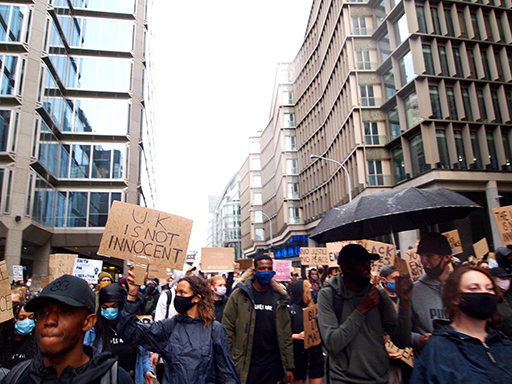1.5 New ways of doing, thinking and feeling are generated
This process of exploring the unknown together in leadership practice generates alternative ways of doing, thinking and feeling. When existing power is disrupted, destabilised or even overturned, a vacuum of sorts is left and space is created for alternative values and practices. Leadership inevitably, therefore, involves some kind of reckoning with what an alternative future might look like. Many revolutionary or radical movements fail because they do not have a plan for what an alternative will be if they are successful at unseating power. There were examples of this vacuum during the Arab Spring protests of the early 2010s. Several of these resulted in more problematic regimes entering power than the ones that were unseated because the activists were not organised enough, or powerful enough, to implement a plan.
One of the reasons why Black Lives Matter is such a potent example of leadership is because it works at the level of doing, thought and feeling and it can, if you allow it, push at the limits of what organisations think is possible. It has forced a reckoning with how people view institutions and organisations at quite a fundamental level, asking whether their actions match their professed values. People may feel shame, for example, that their organisation continues to be associated with the slave trade despite publicly standing for equality. Such reckonings – often glibly dismissed as merely ‘cultural’ and surface-level issues – can in turn prompt deeper critical thinking about the practices followed by organisations. Processes of feeling and thought, experienced together or alone, prompt conversations and actions that unsettle the status quo. They also generate new modes of thinking, feeling and doing.
Important in this process of generating new ways of doing, thinking and feeling is the emergence of new leaders – people who are empowered to act. The academic term for the capacity to act is ‘agency’. Leadership is a practice that involves developing and unleashing people’s capacity to act in and against power. This acting and the development of the capacity to act is a collective process, where many people work together, build one another up, even if in practice only one or a few people step into a publicly prominent position.
Finally, you can note from the discussion above that leadership holds great potential for enriching action for racial equity and justice. Leadership invites us to work on the level of meaning and feelings. Racist sentiment is also generated at the level of feelings and works in pernicious ways to mislead and corrupt meaning. Leadership work can therefore confront racism on the level of meaning, working to transform how people think, feel and act. But leadership can also provide alternative visions of the future that rely on hope, care and love, rather than hate and mistrust.

